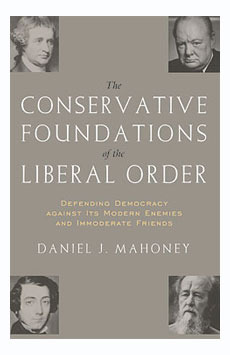The Necessity and Limits of Politics

The Necessity and Limits of Politics: A Review of Daniel J. Mahoney's The Conservative Foundations of the Liberal Order | Fr. James V. Schall, S.J. | Ignatius Insight | June 21, 2011
"When self-sufficiency and freedom are severed from their dependence upon and completion in God, the human person creates for himself a false destiny and loses sight of the eternal joy for which he has been made."
— Pope Benedict XVI, "The Meaning of the Gospel," To Bishops of the Philippines (Ad Limina Meeting of Philippine Bishops, L'Osservatore Romano, February 23, 2011).
"A laudable respect for the accomplishments of different cultures has given way to an absolute relativism that denies the very idea of universal moral judgments and a universal human nature."
— Daniel J. Mahoney, The Conservative Foundations of the Liberal Order: Defending Democracy against Its Modern Enemies and Immoderate Friends (Wilmington: ISI Books, 2010), p. 102.
I.
Though it has some important things to say about politics, the New Testament is not a book of politics. Indeed, the early Christians took a considerable amount of time to come to terms with the political order, an effort pioneered by Augustine more than anyone else. That the New Testament was not somehow a substitute for the Politics of Aristotle or any other political book did not mean that  politics was not important. It was just not the most fundamental thing about us.
politics was not important. It was just not the most fundamental thing about us.
The New Testament tells us primarily about our final purpose and end, not our temporal life in which our end is to be worked out with not a little "fear and trembling," as St. Paul put it. The New Testament did not think it necessary to have a formal teaching about politics. This absence of politics implied that men had sufficient intelligence and experience by themselves to figure out its basics. Revelation presumed and expected men to use their brains. Besides, Plato and Aristotle had already outlined most of the important things.
Even though Aristotle had said "man is by nature a political animal," he also recognized, as did Augustine, the messiness—to use no stronger word—that could flow from politics. To be unaware of the lethal dangers of politics was not really possible to the early Christians. They were often under constant persecution, as many Christians are in the world today though we do not much notice them. Both Popes John Paul II and Benedict XVI have remarked on the relation of the death of Socrates to the death of Christ. These deaths gave rise to the classical question of political philosophy about whether a regime can be found in which the best man would not be killed. It is still an open question. Modern liberal often claimed that it could do so, but things kept going wrong, even in Paradise.
What marks modern Church thinking on politics is that politics are primarily the task of laymen. Benedict calls it a "healthy secularity." The Church has indeed proposed what it calls its "social doctrine." This ongoing effort thinks out the general lines of an adequate social and political order. The Church acknowledges that responsibility for the temporal order is not the competence of the hierarchy.
Catholic social doctrine combines revelational and reasonable analyses into a coherent whole. It has accepted many of what are called modern political institutions that would guarantee the freedom of the Church's mission in the world as well as promoting the common good of citizens. What it has more and more run up against since nineteenth- and twentieth-century socialism, capitalism, communism, fascism, liberalism, and now Islam are concepts of politics that admit to no limits.
Politics, in effect, becomes a militant rival to the revelational understanding of man.
Carl E. Olson's Blog
- Carl E. Olson's profile
- 20 followers



